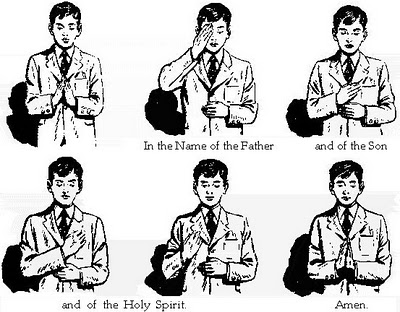
 |
Freethought & Rationalism ArchiveThe archives are read only. |
|
|
#1 |
|
Veteran Member
Join Date: Jun 2010
Location: seattle, wa
Posts: 9,337
|
I have to admit there are often massive gaps in my knowledge base. For instance, I never knew the term “chrismon”
http://en.m.wikipedia.org/wiki/Chrismon I have no idea how old the term is. Yet it seems obviously developed from chresmon, the chi-rho symbol used by Greek readers to note a useful or good passage in a book. Yet even with my confession of ignorance I am even more amazed that anyone can argue that chi-rho ever originally meant “christos” in Christianity. Doesn't the very term chrismon settle the question of whether Jesus was originally called chestos or christos? At the very least it supports the primacy of chrestos in Christianity |
|
|
|
|
#2 | |
|
Veteran Member
Join Date: Jun 2010
Location: seattle, wa
Posts: 9,337
|
You know you've hit something important when all the books that show up in a Google search are mostly in German. On the subject of the development of chrismon from chresimon:
http://books.google.com/books?id=rxE...rismon&f=false A German article which disappeared from the internet but is still available in Google Quickview https://docs.google.com/viewer?a=v&q...LVZwDhX7IUcvoQ The French wikipedia for chrisme entry for (= chi rho; who knew!) reads: Quote:
http://books.google.com/books?id=wWE...rismon&f=false Isidore's entry for the Greek word chresimon "Chresimon haec sola ex voluntate vniuscuiusque ad aliquid notandum ponitur" with commentary by Migne http://books.google.com/books?id=ggT...rismon&f=false |
|
|
|
|
|
#3 |
|
Veteran Member
Join Date: Jun 2010
Location: seattle, wa
Posts: 9,337
|
The French article listed above is very interesting. It is by Jean-Pierre Rossignol who according to this article http://books.google.com/books?id=YDg...esseur&f=false was a professor of Greek at the College de France and a member of the Academie des Inscriptions since 1853. In any event he points to a reference here from Papias to the chrismon:
Papias, d'après Ducange (Glossar., v. Benevalete), dit « Que le signe, qui se met en tête d'un Privilège, est ou un chrisme, ou la croix du Seigneur." Signum autem in Privilegii exordio vel crismon, vel crux Dominica, cum crismon erit. http://books.google.com/books?id=FbU...dio%22&f=false The full quote from Papias is here: Privilegia summorum Episcoporum (in MSS. Sacerdotum) sunt cujuslibet Ecclesiæ concessiones Pontificum, quorum materia hæc est, ut dicat Pontifex erogatum cujuslibet dignæ personæ, vel alia qualicunque ratione Ecclesiæ illi, illa, seu illa Pontificali concedere et roborare dignitate. Anathema ponatur in calce Epistolæ. Habent autem et Privilegia prologos, sicut et cæteræ Epistolæ, et Monogrammata hujuscemodi in fine, (illustration ) quod est Benevalete. Signum autem in Privilegii exordio vel crismon, vel Crux Dominica, cum crismon erit. Crismon autem ejusmodi effigiabatur specie (illustration ) Ut autem plenius in hoc Monogrammate nomen Christi appareat, tali mea sententia effigiabitur specie, (illustration ), vel sic, (illustration ). Consueverunt præterea in extremo margine privilegii quosdam insignire orbiculos, Antistitis nomen, et paucula quælibet verba continentes in hunc modum : (illustration ) http://ducange.enc.sorbonne.fr/BENEVALETE The most important part of the 'quote' from Papias reads: The sign, which starts at the top of a privilege is or chrism, or the Lord's cross. Apparently this was not the ancient Papias but a Papias the grammarian from the 11th century. I am having difficulty believing that the ancient Papias wrote this. Apparently the reference is to the fact that the chi-rho appeared at the top of Papal documents in the period. |
|
|
|
|
#4 |
|
Veteran Member
Join Date: Jun 2010
Location: seattle, wa
Posts: 9,337
|
The point of course is that the since Christians identified the chi rho as the first letters of chresimon Jesus must have originally been identified as the “right one” rather than the anointed one. There are supplementary arguments to strengthen this identification. The gospel portrays Jesus as avoiding or rejecting the title “the Christ.” Jesus does not mirror the Jewish expectation for the Christ. There are early Christian traditions which explicitly deny the claim that he ever claimed to be the Christ and call him Chrestos. The Jews deny he was the Christ and are portrayed in the gospel as (mistakenly) claiming he identified himself as the Christ. The idiot disciple Peter thought Jesus was the Christ (and Peter is portrayed as an unreliable witness). Jesus's head is never anointed. He is never portrayed as undergoing a coronation while living. The chi-rho symbolism doesn't make sense with respect to the crucifixion and specifically a chi-rho shaped cross (in other words, if it was established by God that the cross was shaped like a chi-rho it would could only mean that he was the Right One or that his sacrifice was right, useful or deserving attention; those gazing at the chi-rho would not be expected to connect it with christos)
|
|
|
|
|
#5 |
|
Veteran Member
Join Date: Jun 2010
Location: seattle, wa
Posts: 9,337
|
Oh, and there is at least one more. “The right one” is a pre-existent Alexandrian Jewish title of God/a god and those who call Jesus Chrestos only identify him as a god (he has no humanity)
|
|
|
|
|
#6 |
|
Veteran Member
Join Date: Jun 2010
Location: seattle, wa
Posts: 9,337
|
Another interesting thing is that if one “made the sign of the chresimon” in the manner in which Christians “make the sign of the cross” it would be made in three strokes (ie like baptism etc). Moreover it would make sense (it would be like a marginal chresimon only now confirming the individual was “right” = a Christian/ Chrestos)
|
|
|
|
|
#7 |
|
Veteran Member
Join Date: Jun 2010
Location: seattle, wa
Posts: 9,337
|
... and then it occurred to me that there are three parts to the 'sign of the cross'
 I wonder whether it was originally done in three strokes to match the three lines of the chresimon:  The first stroke down (= rho) was 'the Father' and then the two sides of the chi were the two hypostases (variously identified as 'theos' 'kurios' or 'Son' and 'Spirit etc). It just seems to match the trinitarian pattern in the ritual |
|
|
|
|
#8 | |
|
Veteran Member
Join Date: Jun 2010
Location: seattle, wa
Posts: 9,337
|
When you think that the earliest sacred documents had chresimons at the top of the holy text (http://books.google.com/books?id=4XC...rge%22&f=false) it only makes sense that the same 'blessing' would have originally been made on people. Remember the earliest depictions of crosses did not look T-shaped. I have already shown that the Epistle to Barnabas was altered from Clement's 'the three hundred represents the sign of the Lord' (= the three strokes of the chresimon, each representing the holy number 100) to the existing manuscripts which explicitly reference the T-shaped cross. It is worth noting that Clement makes reference to the gospel having Jesus say that we must bear about 'the sign' (= the chresimon) or this passage from the Exhortation to the Heathens:
Quote:
|
|
|
|
|
|
#9 |
|
Veteran Member
Join Date: Sep 2010
Location: Texas
Posts: 5,810
|
If you had trouble there is no hope for me. Last Wednesday at youth group, one of the lady leaders was complaining about Tim Tebow putting his number 15 on his football shoes. I thought about it for a little while and commented that 15 in Greek was XV which could be a symbol for (X) Christ or Christos and (V) could be for victory which could be construed to mean victory in Christ.
|
|
|
|
|
#10 |
|
Veteran Member
Join Date: Jun 2010
Location: seattle, wa
Posts: 9,337
|
You could have said that in Hebrew 15 = yah the name of God.
|
|
|
| Thread Tools | Search this Thread |
|